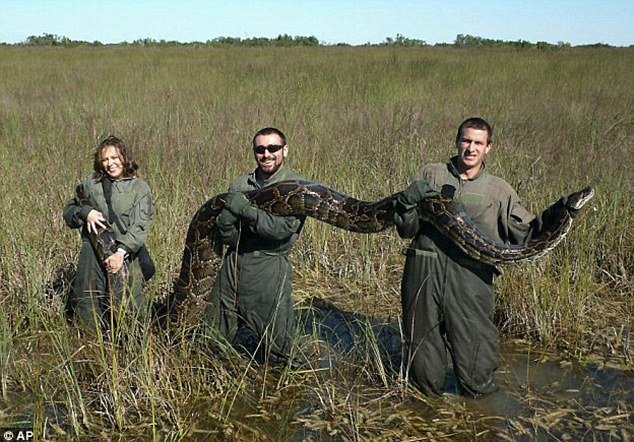
The Florida Fish and Wildlife Conservation Commission has announced this week a massive, month-long hunt for Burmese pythons in the state – offering a $1,500 prize to the person who harvests the most snakes.
The Commission’s 2013 Python Challenge kicks off on January 12th as an initiative to inform the public of the dangerous impact of the tens of thousands of snakes that are threatening endangered species in the Everglades national park.
Burmese pythons, native to Southeast Asia, prey upon the endangered Key Largo wood rat and the endangered wood stork in the Everglades. Additionally researchers told CNN that massive numbers of rabbits, foxes, raccoons, opossums and bobcats have disappeared due to the snakes.
To avoid a complete depletion of the wildlife populations, hunters are invited to apply to join the contest.
You must have a valid Florida hunting license and Wildlife Management Area permit to participate, pay a $25 fee and complete an online training course that teaches safety measures for hunting pythons.
The commission is stressing that they are encouraging hunters to use humane measures to execute the snakes. They suggest shooting the snake in the head with a firearm or decapitating it with a machete.
The grand prize of $1,500 will be distributed to the hunter who kills the most pythons. A reward of $1,000 will go to the person who hunts the longest snake. The rules specified that the snake must be harvested but the hunters themselves, road kill will not be eligible.
The contests ends on February 10th and has been marketed as not just a hunt but a time to inform the public of the impact the snake is having on the habitat.

Tens of thousands of Burmese pythons are believed to be living in the Everglades, where they thrive in the warm, humid climate.
While many were apparently released by their owners, others may have escaped from pet shops during Hurricane Andrew in 1992 and have been reproducing ever since.
Burmese pythons can grow to be 26 feet long and more than 200 pounds, and they have been known to swallow animals as large as alligators. They and other constrictor snakes kill their prey by coiling around it and suffocating it.
The National Park Service has counted 1,825 Burmese pythons that have been caught in and around Everglades National Park since 2000. Among the largest so far was a 156-pound, 16.4-foot one captured earlier this month.
A study, released in January, in the Proceedings of the National Academy of Sciences, reported that medium-size mammals are down dramatically – as much as 99%, in some cases – in areas where pythons and other large, non-native constrictor snakes are known to be lurking.
Scientists fear the pythons could disrupt the food chain and upset the Everglades’ environmental balance in ways difficult to predict.
The FWC will be holding events throughout the hunting fest to raise awareness of the species which are being threatened.
“The FWC is encouraging the public to get involved in helping us remove Burmese pythons from public lands in south Florida,” Kristen Sommers, head of the FWC’s Exotic Species Coordination Section, said in a statement.
“By enlisting both the public and Florida’s python permit holders in a month-long competitive harvesting of Burmese pythons, we hope to motivate more people to find and harvest these large, invasive snakes. The Python Challenge gives people a chance to sign up for a competition to see who can catch the longest or the most pythons.”
“Part of the goal of the Python Challenge is to educate the public to understand why nonnative species like Burmese pythons should never be released into the wild and encourage people to report sightings of exotic species,” she added.
[youtube ifRqSwGc-HY]